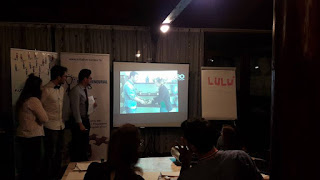We make decisions everyday - some of them
are important, some others not really. That October morning, I had no idea that
the decision I make will get me for over a week to the Romanian seaside city,
through Rome, Bucharest and Budapest.
While I was scrolling through Facebook I
saw a post about a youth exchange in Romania. I didn’t pay much attention to it
and moved on with my daily routine - at least till the moment when I met up
with my very best friend Ania that has seen the Romanian exchange post as well.
“So, maybe we could do this”?
“Well, we don’t have plans for November
anyway…”
And just half an hour later we were
applying for our “little Erasmus” as we used to call this exchange. In the next
weeks we found out that a group of six is going to represent Poland. The group
consisted of two more of our friends, we bought the tickets, made to-do lists
for every city we were about to visit and planning everything before going on
the trip. And when the four of us landed in Bucharest after two sleepless nights,
a night of sightseeing Rome and some issues with my luggage being too big while
the size of it was actually ok, we knew in four hours we are going to start the
proper-educational part of our exchange, do quite a lot of activities on
start-ups that scared us a bit because of their professional sounding names - at
least that is what we saw in the schedule. But as soon as we got in the bus
that was going to take us to Eforie Nord we all fell asleep (some of us were
even snoring which really annoyed the driver - but don’t worry Artem, you
didn’t disturb our sleep).
Later that evening when all of the participants from
other five countries arrived we were sitting in an “exercise room” and I looked
at them as a bunch of strangers, wondering what am I doing on this project, if
my English is good enough to be able to debate and work on a social entrepreneurship
topic with others. As I found out our whole group consisted of 30 people from
different countries, cultures and backgrounds but sharing similar fears in this
very moment. In the next few days we had some integration games and team
building exercises.
We have been on two trips where we had a chance to see a
real social enterprise and hear a story of how it was built from the scratch,
we could learn more about Romanian history in ethnic museum in Constanta. During
“culture” nights I had a chance to find out more about home countries of the
participants. I know how it may sound - you imagine now that I saw a few
presentations and now I’ll proudly say that I know something about the Turkish,
Bulgarian or Romanian traditions. The truth is that during these nights I
learnt how to talk with Italians just using gestures, I took a part in Spanish
corrida or what’s more important the polish team could show other people that
our culture does not consist of drinking vodka (however, it’s a big part of it).
I was also lucky enough to celebrate my birthday during this Erasmus adventure.
While I was expecting to hear “happy birthday” song that day, there was much
more waiting for me. First, right after midnight, when I was already in bed,
watching some videos on youtube, half-awake, Ania and the rest of the polish
team had a surprise for me – they knocked on my door and when I opened them I
saw all the participants holding balloons, singing and having a “birthday
bread” for me.
Later that day I had so many birthday group
hugs, heard so many wishes that I stopped to even count them. And when I
thought that nothing else is going to happen – boom! and I was in the middle of
a circle made of everyone singing (again) and I got a real birthday cake this
time. All these events left me speechless so many times that I was scared I’d lose
my voice forever.
During the last days we worked on our social businesses. Well,
if anyone ever told me I’d be enjoying writing a business plan for a rehab
facility that is a farm at the same time I wouldn’t believe them! But here I
was - loving calculating the price of the bio cow, etc. What we didn’t know back at that first evening was that we were all
going to stand in the same room in ten days not as group made of 30 random participants
of one of the Erasmus+ projects but as a friends, as open-minded people that
share the same interests and hobbies (not fears anymore), taking part not in
one of the projects but being a part in the START-UP MACHINE project. What happened?
I like to believe it was magic of Erasmus.
When I got off the
plane in Warsaw, Poland I knew nothing was going to be the same any more. It’s
already been more than a month since I did it and I still can’t get over the
feeling that Ania is going to wake me up saying that I’ll be late and I’ll have
to do “spanishment”, I’ll eat ciorba watching Romanian music videos at my
polish-bulgarian table, I’ll hear “allora”, someone will say “hola Ola”
thinking it’s a brilliant joke, the member of the Spanish team will ask “ok?”,
our facilitator will say “beautiful” when he sees something he doesn’t like or
I’ll chill in my room with all of the members of the polish team. But I won’t.
And that’s the only sad thing in this little Erasmus of mine.
by Ola (Poland)




















































